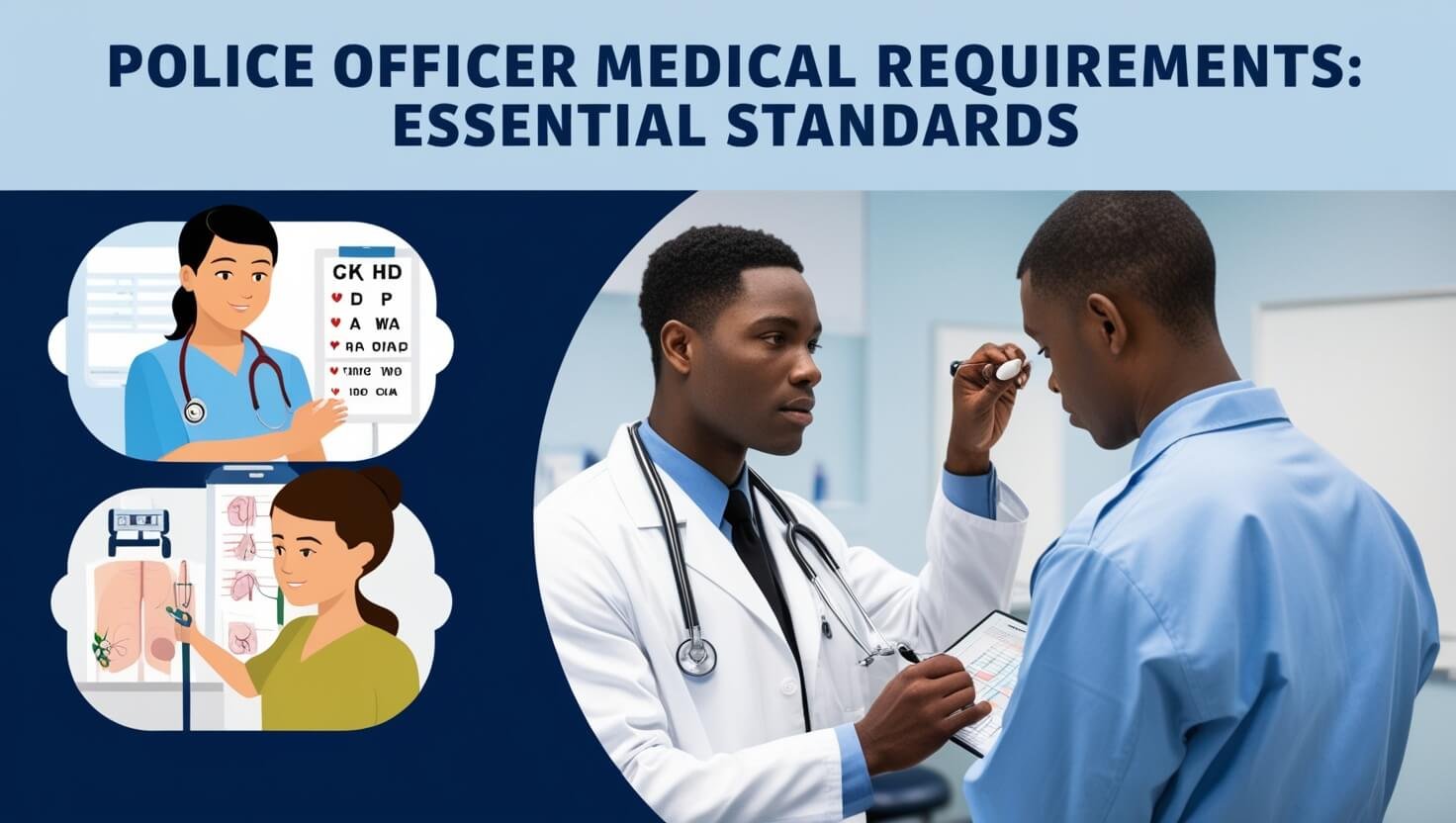Police Officer Medical Requirements: Essential Standards

Police officer medical requirements are extensive and rigorous, designed to ensure officers can perform their duties safely and effectively. These standards typically cover physical fitness, vision, hearing, cardiovascular health, and mental well-being.
Law enforcement is a demanding profession that requires officers to be in top physical and mental condition. From chasing suspects to making split-second decisions under pressure, police officers need to be prepared for anything. That’s why police departments across the country have strict medical requirements for their recruits and serving officers.
This guide will explore the various medical standards aspiring and current police officers must meet. We’ll cover everything from basic physical fitness to specific health conditions that might affect an officer’s ability to serve. Whether you’re considering a career in law enforcement or just curious about what it takes to wear the badge, this article will give you a thorough understanding of police officer medical requirements.
Introduction to Police Officer Medical Standards
Why Medical Requirements Matter for Law Enforcement
Medical standards for police officers aren’t just bureaucratic hoops to jump through. They serve several crucial purposes:
- Officer safety: Healthy officers are better equipped to handle the physical demands of the job.
- Public safety: Officers need to be in top form to protect and serve effectively.
- Longevity: Good health helps officers sustain long, productive careers.
- Reduced liability: Departments minimize risks by ensuring officers are medically fit for duty.
Overview of the Medical Screening Process
The medical screening process for police officers is comprehensive and multi-faceted. It typically includes:
- Physical examinations
- Vision and hearing tests
- Cardiovascular assessments
- Strength and endurance evaluations
- Mental health screenings
- Drug tests
These screenings usually occur during the initial hiring process and may be repeated periodically throughout an officer’s career.
Physical Fitness and Body Composition
Body Mass Index (BMI) Standards for Police Officers
While specific standards vary by department, many use Body Mass Index (BMI) as a general guideline for officer fitness. A typical BMI range for police officers is between 18.5 and 29.9, which falls within the “normal” to “overweight” categories.
However, it’s important to note that BMI isn’t a perfect measure. Muscular individuals may have a higher BMI without excess body fat. That’s why many departments combine BMI with other fitness assessments.
Physical Fitness Tests and Expectations
Police departments often use standardized physical fitness tests to evaluate candidates and officers. These tests might include:
- 1.5-mile run
- Push-ups
- Sit-ups
- Vertical jump
- 300-meter sprint
The exact requirements vary, but officers are generally expected to perform at a level significantly above average for their age and gender.
Vision Requirements for Police Officers
Visual Acuity Standards
Good vision is crucial for police work. Most departments require:
- Uncorrected visual acuity of at least 20/40 in both eyes
- Corrected visual acuity of 20/20 in both eyes
Some departments may have stricter standards, especially for specialized units.
Color Vision Testing
Color vision is important for tasks like identifying suspects, reading traffic signals, and handling evidence. Most departments test for color vision deficiencies using tests like the Ishihara plates or the Farnsworth D-15 test.
Peripheral Vision Assessments
Officers need good peripheral vision to maintain situational awareness. Typical requirements include a horizontal field of vision of at least 140 degrees in each eye.
Hearing Standards in Law Enforcement
Audiometry Tests for Police Candidates
Hearing tests for police officers usually involve pure-tone audiometry. Candidates typically need to demonstrate:
- Hearing threshold of 25 decibels or better in each ear at frequencies of 500, 1000, 2000, and 3000 Hz
- No significant hearing loss at 4000 Hz
Acceptable Hearing Aid Use
Some departments allow the use of hearing aids to meet these standards. However, officers may need to demonstrate they can perform duties effectively with their hearing aids, including in noisy environments.
Cardiovascular Health for Police Officers
Blood Pressure Guidelines
Hypertension can be a significant health risk for police officers. Most departments require:
- Blood pressure below 140/90 mmHg
- No history of uncontrolled hypertension
Heart Condition Assessments
Officers undergo thorough cardiac evaluations, which may include:
- ECG (electrocardiogram)
- Stress tests
- Echocardiogram (for candidates with concerning medical histories)
Any history of heart disease or significant cardiac events is carefully evaluated.
Respiratory Function Requirements
Lung Capacity Tests
Respiratory health is crucial for the physical demands of police work. Officers typically undergo spirometry tests to measure lung function. Key metrics include:
- Forced Vital Capacity (FVC)
- Forced Expiratory Volume in 1 second (FEV1)
Asthma and Other Respiratory Conditions
While a history of asthma doesn’t automatically disqualify candidates, it’s carefully evaluated. Officers with asthma must demonstrate:
- Good control of symptoms
- Normal lung function tests
- Ability to perform duties without limitations
Other respiratory conditions, like chronic obstructive pulmonary disease (COPD), may be disqualifying if they significantly impact lung function or exercise capacity.
Musculoskeletal Health in Policing
Strength and Flexibility Standards
Police work demands a high level of physical capability. Officers need to demonstrate:
- Upper body strength for tasks like restraining suspects
- Core strength for stability and injury prevention
- Lower body strength for running and climbing
- Flexibility to reduce injury risk
Previous Injury Considerations
A history of injuries doesn’t necessarily disqualify candidates, but it’s carefully evaluated. Key considerations include:
- Full recovery from previous injuries
- No chronic pain or limitations
- Low risk of re-injury
Conditions like chronic back pain or knee instability may be disqualifying if they interfere with job duties.
Neurological Assessments for Police Candidates
Seizure Disorders and Eligibility
A history of seizures is a significant concern in law enforcement due to the potential for sudden incapacitation. Most departments require:
- No seizures in the past 5-10 years
- No use of anti-seizure medications
Balance and Coordination Tests
Officers need good balance and coordination for tasks like pursuing suspects and handling weapons. Assessments may include:
- Standing balance tests
- Dynamic balance assessments
- Coordination exercises
Any neurological conditions that affect balance or coordination are carefully evaluated.
Mental Health Evaluations in Law Enforcement
Psychological Screening Process
Mental health is as important as physical health for police officers. The psychological screening typically includes:
- Written personality assessments
- In-depth interviews with psychologists
- Evaluation of stress management skills
Stress Resilience Assessments
Police work is inherently stressful. Candidates are evaluated for their ability to:
- Handle high-stress situations
- Maintain emotional stability
- Cope with trauma exposure
A history of mental health conditions doesn’t automatically disqualify candidates, but it’s carefully considered in the context of the job demands.
Substance Use and Drug Testing
Pre-employment Drug Screening
All police departments conduct pre-employment drug tests. These typically screen for:
- Marijuana
- Cocaine
- Amphetamines
- Opioids
- PCP
Ongoing Substance Use Policies
Most departments have strict policies on substance use, including:
- Random drug testing
- Prohibitions on illegal drug use
- Restrictions on alcohol use before and during shifts
Officers are expected to maintain a lifestyle free from substance abuse.
Medical History Review
Disclosing Pre-existing Conditions
Candidates must provide a comprehensive medical history. This includes:
- Chronic health conditions
- Past surgeries
- Medications
- Family history of certain diseases
Honesty is crucial – failing to disclose relevant medical information can result in disqualification.
Impact of Childhood Health Issues
Childhood health problems aren’t necessarily disqualifying. Key considerations include:
- Full recovery
- No ongoing symptoms or limitations
- Low risk of recurrence
Each case is evaluated individually based on current health status and job requirements.
Vaccinations and Immunization Requirements
Required Vaccinations for Police Officers
Police officers are often required to have up-to-date vaccinations, including:
- Tetanus
- Hepatitis B
- Influenza (annual)
- COVID-19 (in many jurisdictions)
Hepatitis B Immunization Standards
Hepatitis B vaccination is particularly important due to the risk of exposure to bodily fluids. Officers typically need to show:
- Completed Hepatitis B vaccination series
- Adequate antibody levels
Those who can’t receive the vaccine may need to sign a waiver.
Special Considerations in Police Medical Assessments
Age-related Medical Standards
While age discrimination is illegal, some departments have maximum age limits for new officers due to the physical demands of the job. Older candidates may face additional scrutiny in their medical evaluations.
Gender-specific Health Considerations
Medical standards are generally the same for all genders, but there may be adjustments in fitness test scoring. Pregnancy and related conditions are addressed on a case-by-case basis.
Ongoing Health Maintenance for Police Officers
Annual Medical Examinations
Many departments require annual medical check-ups for officers. These typically include:
- Physical exam
- Vision and hearing tests
- Blood work
- Fitness assessment
Fitness for Duty Assessments
Officers may undergo fitness for duty evaluations after injuries, illnesses, or prolonged absences. These ensure the officer can safely return to full duties.
Appealing Medical Disqualifications
Understanding the Appeal Process
Candidates disqualified for medical reasons often have the right to appeal. The process typically involves:
- Requesting a review of the decision
- Submitting additional medical documentation
- Possibly undergoing further evaluations
Providing Additional Medical Evidence
Successful appeals often involve:
- New medical evaluations
- Specialist opinions
- Evidence of successful treatment or management of conditions
It’s important to work closely with healthcare providers during this process.
Future Trends in Police Officer Medical Requirements
Evolving Standards in Law Enforcement Health
Medical standards for police officers continue to evolve. Future trends may include:
- Greater emphasis on mental health and resilience
- More comprehensive cardiac screening
- Increased focus on long-term health and wellness
Technological Advancements in Medical Screening
New technologies are changing how medical evaluations are conducted. We may see:
- Advanced imaging techniques for early disease detection
- Wearable devices for ongoing health monitoring
- AI-assisted health risk assessments
These advancements could lead to more accurate and comprehensive health evaluations for police officers.
Conclusion: Ensuring a Healthy and Capable Police Force
Police officer medical requirements play a crucial role in maintaining a capable and effective law enforcement workforce. These standards ensure that officers are physically and mentally prepared for the challenges of their job, promoting both officer and public safety.
While the requirements may seem stringent, they’re designed with the best interests of officers, departments, and communities in mind. As our understanding of health and wellness continues to evolve, so too will these standards, always with the goal of supporting the men and women who serve and protect our communities.
For anyone considering a career in law enforcement, understanding these medical requirements is an important first step. By maintaining good health and fitness, aspiring officers can position themselves for success in this challenging and rewarding field.






